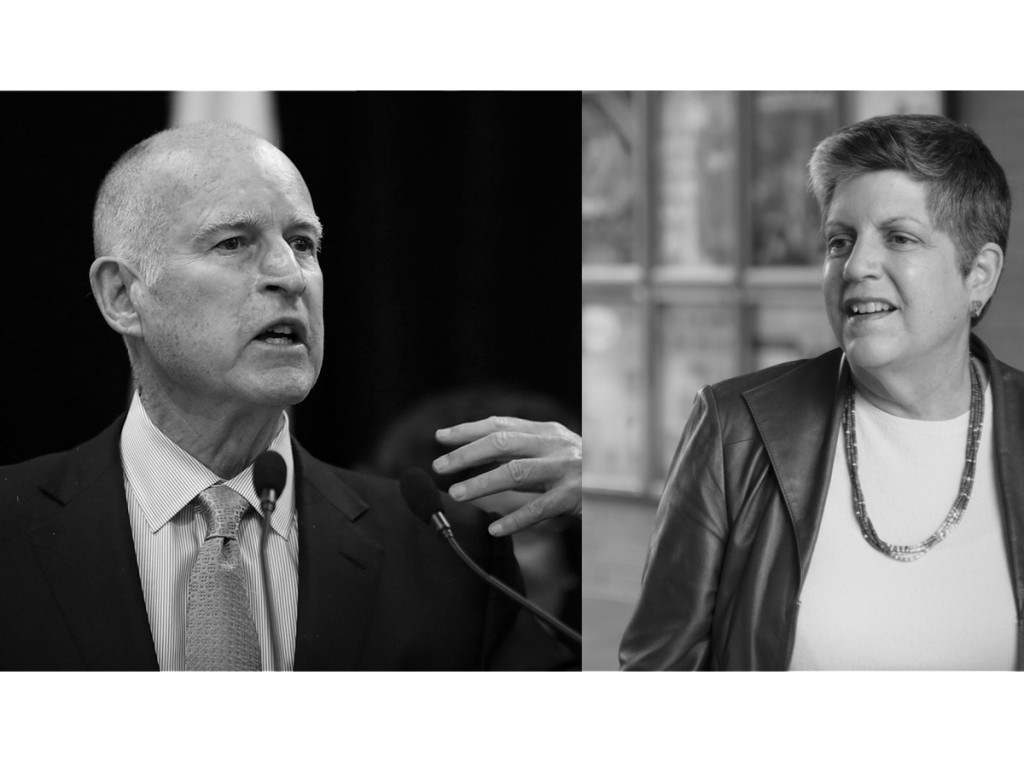
Only one year into her first year as UC president, Janet Napolitano is facing her most difficult challenge yet. It’s not about passing her much talked-about tuition plan, though — it’s taking on the titan of California politics, Gov. Jerry Brown.
By now, almost every student has heard about it: tuition increases. Napolitano has announced that the UC Board of Regents will be presented with a proposal to cap tuition increases at 5 percent per year for five years, depending on state funding levels. The challenge isn’t the tuition plan — that’s all but assured to pass. There has been some hedging here and there by a few people, but when the UC Board of Regents considers it at their meeting this week, the three-year tuition freeze will in all likelihood be thawed.
If so, Napolitano could set in motion a chain of events that could actually restore state funding to the UC and result in few, if any, tuition increases. This is because the proposal has a release valve: If the state boosts its funding, the plan allows for tuition to stay constant. Gov. Brown has campaigned on keeping tuition frozen for Californians and shepherding through legislation to fund higher education. If tuition increases go through, the burden falls on students and parents, and political pressure will fall on Brown to do something about it. The calculation is that the threat of tuition hikes forces Brown to take action and begin funding the UC as it should be.
There is some evidence that this could work. Over the past decade, even as tuition has increased, Cal Grant awards have similarly increased by over a half-billion dollars. And even as tuition skyrocketed for most students, low-income students were for the most part completely covered by financial aid. It’s arguable that the steep tuition increases ultimately pressured the legislature into passing the Middle Class Scholarship Act, which has just gone into effect this academic year.
This is a big gamble by Napolitano. But in some ways, the UC doesn’t have a choice. Gov. Brown has been downright miserly when it comes to state funding for higher education. The UC receives $2.64 billion from the state’s general fund, which reflects a drop of 14 percent, or almost $500 million, since before the recession. Not only has overall funding decreased, per-student funding has declined as well. In this same timespan, enrollment increased by more than 18,000 students — nearly the entire student population of UC Riverside.
Perhaps his emphasis on fiscal prudence was somewhat justified a few years ago, when the state was still deep in recession. But today? The unemployment rate is 6.9 percent, five and a half percentage points lower than the height of the recession and just a tick above the national average. A recently released survey shows economic performance humming along, with California reclaiming its No. 8-in-the-world status, beating out Italy and Russia. We have our first budget surplus in years. California can now boast of its A-plus credit rating.
Yet the UC hasn’t benefitted much from the state’s financial improvement. Way back in 2012, students were integral in the passage of Proposition 30, which Gov. Brown promised would dedicate more funding to the UC. What we got was a measly 1.7 percent increase in the UC’s academic budget, barely enough to keep pace with inflation. More incremental proposals felt the pain of the governor’s veto pen — a one-time cash infusion of $50 million was slashed, despite the support of the legislature and a personal campaign by Assembly Speaker Toni Atkins. Each time, the person standing in the way has been Jerry Brown.
With this track record, there’s not much the UC can do. Even if the university has massive support in the legislature, Gov. Brown can easily remove funding with his line-item veto. There’s nothing in the text of the proposition that says that more money needs to go to the UC. Simply put, there’s no way for the UC to force Gov. Brown to reinvest in higher education.
Except possibly one — and this tuition plan is it. Napolitano has just set in motion a real-time political battle between two very astute politicians, and there is a glimmer of hope that it can restore at least a modicum of funding to the UC.
The proposal is nonetheless a huge disappointment for students, and we have every right to be incensed. The proposal breaks an agreement to keep tuition frozen until the 2016-2017 academic year, ironically adding uncertainty to a plan intended to decrease it. Several student leaders have said they weren’t given enough advance notice of the plan. (Napolitano has replied that they have been given the same amount of time as the regents themselves.) To top it off, student debt is higher than ever.
There’s no question that the plan is incredibly risky. For his part, Brown is bolstered in his opposition by a who’s who of political leaders, not to mention his accrual of nearly 60 percent of the vote in the November elections. Napolitano must also remember that she’s not just dealing with pieces of plastic on a chessboard — actual students hang in the balance. Any increase in tuition affects the lives of UC’s more than 230,000 students and their families.
Napolitano was brought on as UC President because of her political chops. Even as students voiced doubts over her experience and record on undocumented immigrants, the belief was that, through her political savvy and know-how, she could help restore funding to the UC. Now is the time for her to show her skills and prove her doubters wrong.
The gambit could easily fail. If it does, and tuition hikes indeed go through; or if tuition increases are enacted despite increases in state funding, Napolitano should be held responsible. She should consider departing her position — or at the very least, her pay should be docked.
But if she succeeds, we could boost our course offerings, ending the purgatory of an endless life as professional students. We could hire more faculty to bring new perspectives. We could renovate our dilapidated buildings, or finance the start of new projects to improve the look of the campus. We could expand outreach programs and ensure that every California student knows that, no matter their background, the UC offers a way forward.
These are still possible, and the tuition proposal may be the only way to achieve state funding for them. But only if Napolitano proves herself the better chess player. If not, she should be wary of students turning the tables and making chess the least of her worries.








